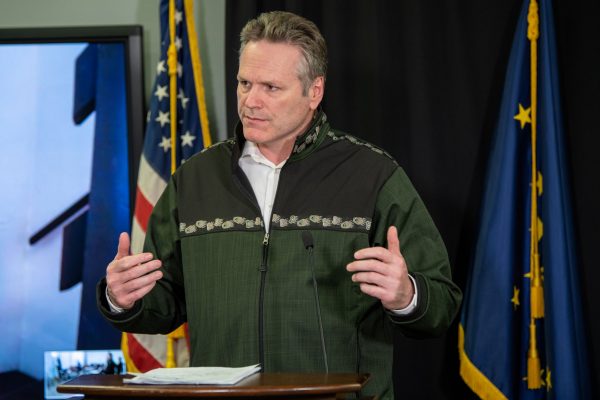
Alaska communities will be receiving a boost in the coming weeks from federal CARES Act relief. But they still face future challenges in paying for services as they finish work on municipal budgets. One area that won’t be funded through the CARES Act are the items vetoed by Gov. Mike Dunleavy last month.
Municipalities are trying to figure out how to make up for the lost money.
Dunleavy described his plan for vetoing line items in the state budget on April 7.
“You’re going to see a number of vetoes, but I will say this: The vast majority of those vetoes — that money, state money, that we vetoed, will be replaced with federal money with the approach to deal with the virus, the CARES Act,” he said.
Some who responded to the vetoes expressed skepticism that this was possible — they said the federal guidance on how states could use money from the law was unclear. Since then, federal guidance has said states can’t use the money to backfill items like those Dunleavy vetoed.
While the federal government may offer more flexibility in the future, Dunleavy’s administration wrote its plan for CARES Act funding without paying for the items he vetoed. And the Legislature didn’t take up the issue of the vetoes during the three days it reconvened in Juneau.
That leaves municipalities in a challenging position.
Kodiak Island Borough Mayor Bill Roberts described what the borough is facing to House Finance Committee members in on April 30.
Roberts said the biggest impact to Kodiak is from two vetoes: state funding to reimburse municipalities for paying off bonds to build schools and assistance to communities. Kodiak lost $5 million from the vetoes.
“I think it’s going to be incredibly hard for the people of Kodiak, for the residents of Kodiak, to backfill the bond reimbursement and also the community assistance,” Roberts said.
Kodiak’s borough assembly is considering raising property taxes roughly $600 per year for someone who owns an average home, in part to make up for the vetoes.
The vetoes of school bond debt reimbursement totaled $100 million. And the community assistance veto was $30 million.
State aid is particularly important for Northwest Arctic Borough, which can’t increase money from one of its major funding sources: It receives a fixed amount under an agreement with the Red Dog Mine operator.
The Alaska Municipal League estimates that Northwest Arctic Borough lost more than $4 million from the veto of school bond debt reimbursement.
Borough Mayor Lucy Nelson described the impact.
“This poses a significant problem and must be fixed, because we cannot impose additional taxes on our residents, as they are economically distressed, and our land is not taxable,” she said.
The Dunleavy administration did take steps to increase CARES Act assistance to Kodiak Island and the Northwest Arctic boroughs. After the mayors provided testimony to lawmakers, the state increased CARES Act funding by nearly $2 million dollars to Kodiak, for a total of $5.8 million in CARES Act money, and nearly $3 million dollars to Northwest Arctic, for a total of $4.1 million.
The North Slope Borough also received an increase of more than $1 million, for a total of $2.5 million from the CARES Act. It wasn’t as heavily affected by the school bond debt reimbursement and community assistance vetoes.
But with restrictions on how municipalities can spend the CARES Act money, some local leaders are concerned about their budgets.
Matanuska-Susitna Borough Mayor Vern Halter is among them.
“There’s just a lot of people that are going to struggle to pay property taxes — you know , the economic devastation to the oil industry, and … tourism, which is huge here in the Mat-Su Borough,” Halter said. “And the devastation to small family businesses — it’s hard to imagine.”
Halter said he’d like to see the Legislature pass funding for municipalities in the future, and if they do, he hopes the governor won’t veto it.
On May 4, Dunleavy described how he would approach it if the Legislature were to pass the money again.
He said the price of oil will have a bearing on the entire state budget, and he’ll have to talk with the Legislature about what the state can afford.
“How are we going to be able to support the government at the size that we have right now, and the expenditures that we have, the services and programs. How do we want to go about doing that?” Dunleavy said.
Alaska Municipal League Executive Director Nils Andreassen said cities and boroughs are still working to understand how the vetoes combine with increased spending and lost revenue from the pandemic, as well as the CARES Act money .
“The vetoes do have an impact,” he said. “There will be local governments that just can’t make that up, out of what they’re able to do with the CARES Act within their budget, or using savings, or reductions to budgets.”
Andreassen said all levels of government are faced with tough choices.
